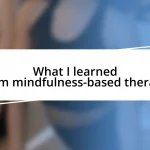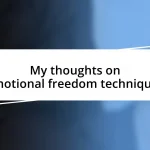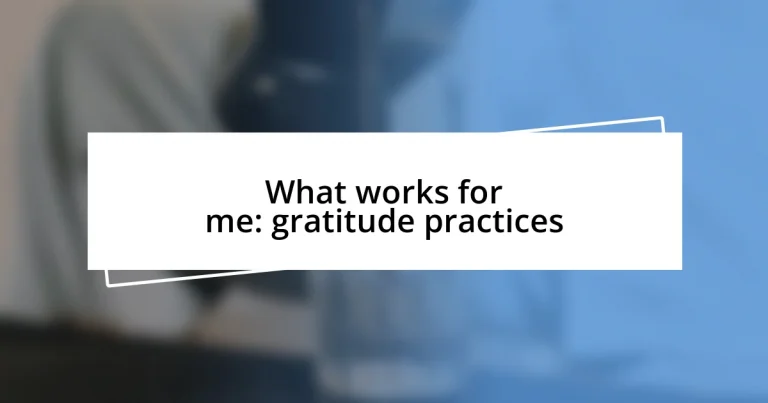Key takeaways:
- Gratitude practices, such as journaling and daily reflections, foster appreciation, enhance mental well-being, and shift focus from negativity to positivity.
- Creative expressions of gratitude, like gratitude nights and personalized playlists, strengthen relationships and deepen connections with others.
- Long-term gratitude practices cultivate resilience, reduce stress, and create a supportive community, ultimately transforming our overall perspective on life and challenges.
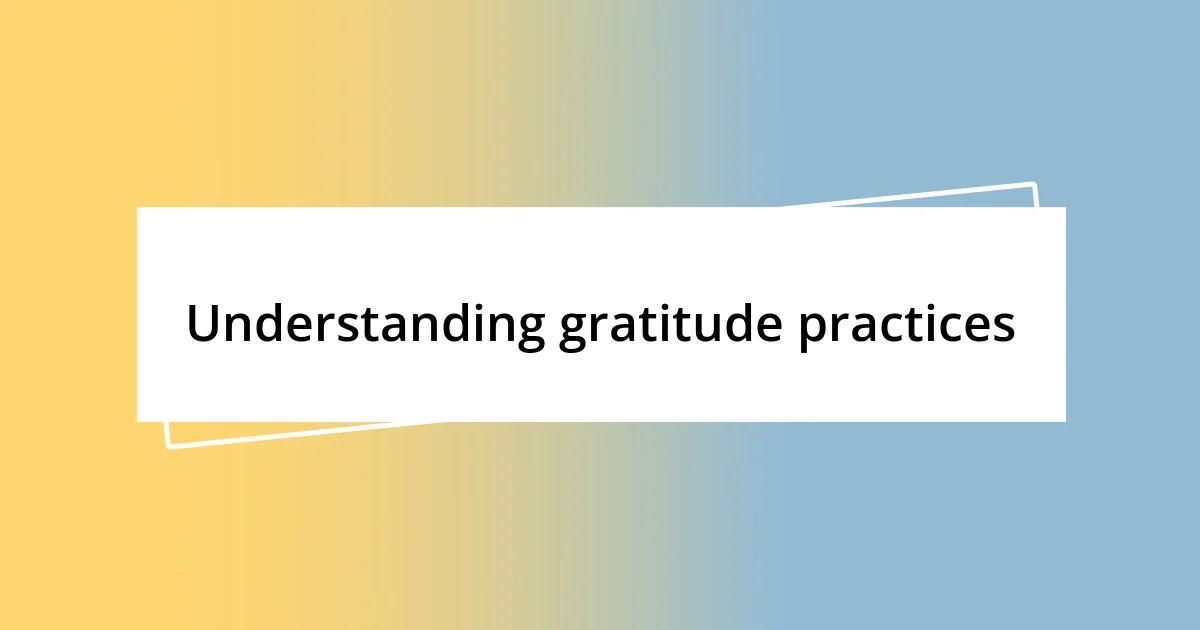
Understanding gratitude practices
Gratitude practices encompass a variety of techniques aimed at fostering appreciation and recognition of the good in our lives. I remember a time when I started keeping a gratitude journal. Each night, I would jot down three things I appreciated that day—sometimes they were big, like a promotion at work, and other times, they were small, like enjoying a hot cup of tea. It became a powerful ritual that shifted my focus from what I lacked to what I truly cherished.
One interesting aspect of gratitude practices is their ability to transform our mindset. Have you ever noticed how just taking a moment to reflect on the positive can lighten your mood? I found that on particularly stressful days, pausing to recount the small joys helped me regain clarity and warmth in my heart. It’s extraordinary how this simple act can reset my emotional compass.
Additionally, understanding gratitude means recognizing that it’s not merely about saying “thank you.” It delves deeper into emotional expression and connecting with our experiences. I’ve learned that when I express gratitude verbally or in writing to others, it creates a ripple effect of kindness and joy. Have you ever shared your appreciation with someone, only to see their face light up? That moment highlights how gratitude nurtures relationships and enriches our lives, making it a truly transformative practice.
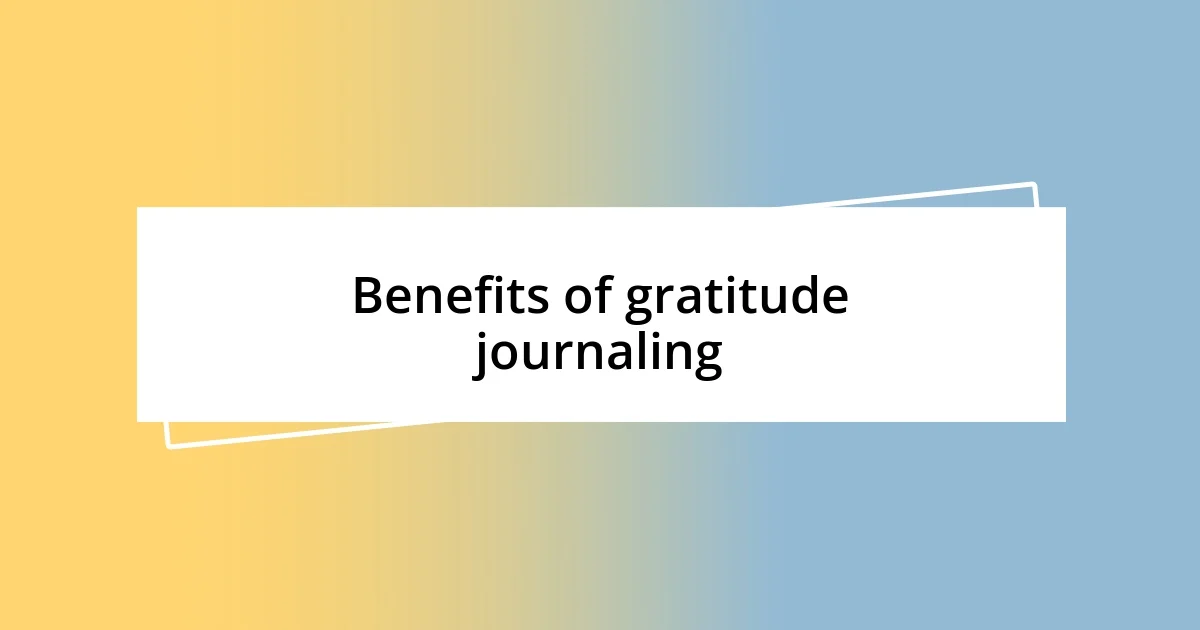
Benefits of gratitude journaling
Practicing gratitude through journaling has profound benefits that can enhance mental well-being. I often found that after writing down my thoughts of appreciation, I went to bed feeling lighter and more at peace. It’s fascinating how merely listing a few positives can shift my perspective and help me sleep better by reducing anxiety.
Through my experience, I’ve noticed that gratitude journaling shifts one’s focus away from negativity. When I began my entries, I realized I spent less time ruminating on the day’s challenges. Instead, I found joy in reflecting on simple moments—like a friend’s unexpected phone call, which made me feel connected and appreciated. This shift has fostered resilience, reminding me that even on tough days, there are always glimmers of hope.
Additionally, gratitude journaling strengthens emotional intelligence. As I wrote about my feelings and what I valued, I became more aware of the sources of my happiness. This practice challenged me to explore why certain moments resonated deeply and how they shaped my interactions with others. Ultimately, I discovered that recognizing and articulating gratitude not only enhanced my mood but also deepened my connections with those around me.
| Benefit | Explanation |
|---|---|
| Improved Mental Health | Promotes feelings of peace and decreases anxiety. |
| Enhanced Perspective | Shifts focus from negatives to positives in daily life. |
| Emotional Intelligence | Increases awareness of happy moments, shaping healthier relationships. |

Daily gratitude exercises
Daily gratitude exercises are simple yet profound actions that can quickly integrate into our daily routines. Personally, I started each morning by setting aside just a couple of minutes to think about three things I was grateful for. It often leaves me feeling energized to tackle the day ahead because I begin with a mindset focused on abundance rather than scarcity.
These exercises can take many forms, and I’ve found that variety keeps it engaging. Here are some that have worked for me:
- Morning Reflection: As soon as I wake up, I list three things I appreciate from the day before to set a positive tone.
- Gratitude Jar: I write down moments of gratitude on small notes and place them in a jar. It’s a wonderful reminder that even the smallest joys count.
- Evening Ritual: Before bed, I spend a few minutes replaying the day in my mind, selecting at least one positive encounter or experience to reflect on deeply.
- Gratitude Walk: When I’m feeling overwhelmed, I take a walk in nature and consciously appreciate the sights, sounds, and feelings I experience while reflecting on things I’m thankful for.
- Appreciation Notes: I write a short note to a friend or family member expressing gratitude, which not only uplifts them but reinforces my feelings of thankfulness.
These daily exercises have been game-changers for me, serving as gentle reminders to savor the little things in life.
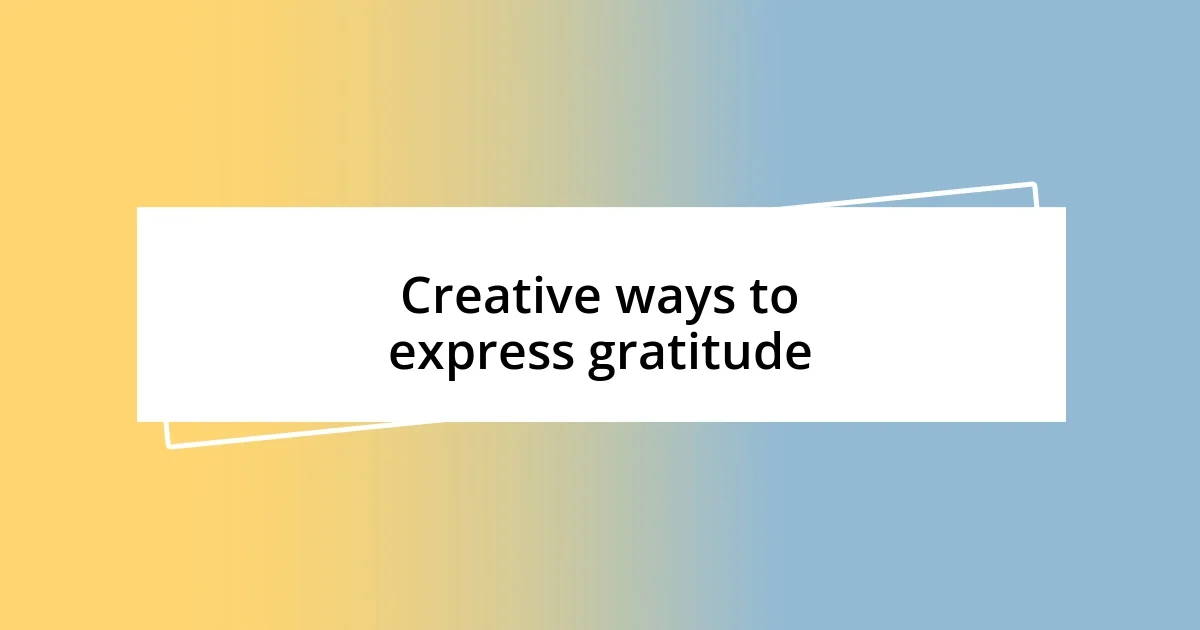
Creative ways to express gratitude
Finding creative ways to express gratitude can transform not just our outlook but also our relationships. For instance, I started hosting a “gratitude night” with friends where we gather and take turns sharing what we appreciate about one another. The warmth in the room, as we recount little moments that made a big difference, is simply heartwarming. Have you ever experienced that kind of connection? It strengthens bonds and creates lasting memories, all around positivity.
Another unique approach is creating a personalized gratitude playlist. I curate songs that remind me of specific people or experiences I’m grateful for. Whenever I play that playlist, I can’t help but smile as memories rush back to me—like the time I danced in my kitchen to a song that reminded me of my sister’s laughter. Music has this incredible ability to evoke emotions, and using it as a tool for gratitude really makes the appreciation come to life.
Then there’s the visual aspect—art can be a profound expression of gratitude. I once painted a simple canvas dedicated to my family, capturing moments that defined our bond. Each brushstroke was a thank you, a way to communicate love and appreciation without words. Have you thought about how art could help you express your own gratitude? It opens doors to exploring feelings that often go unspoken. The creative process itself nurtures a deeper understanding of what we value in life.
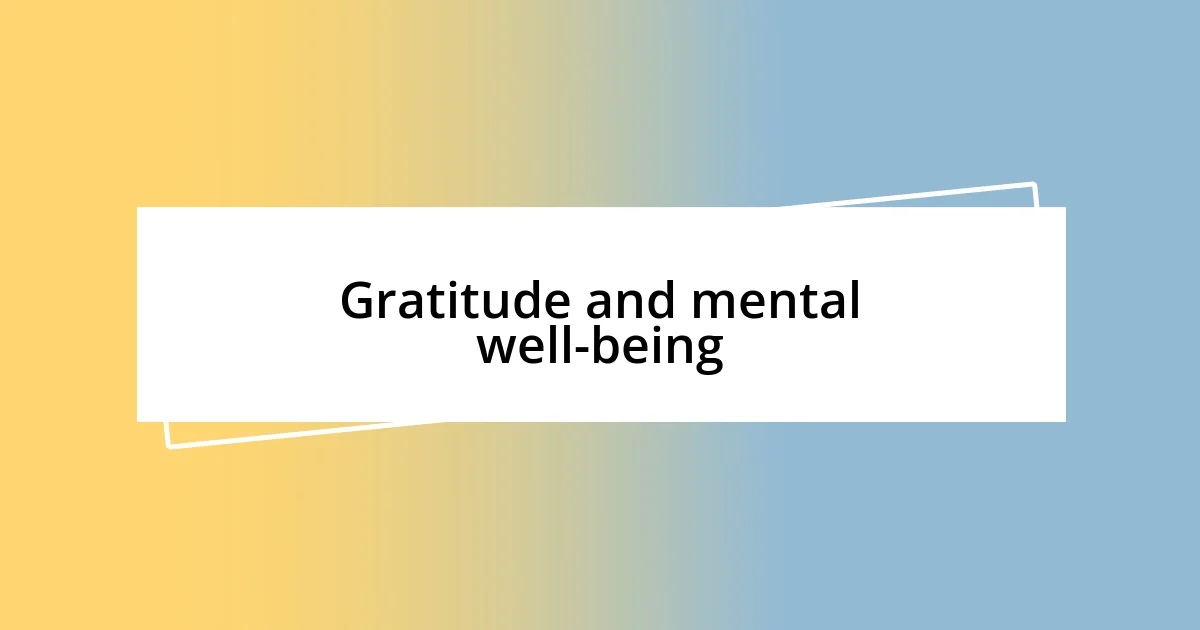
Gratitude and mental well-being
Gratitude has a remarkable impact on mental well-being, acting as a powerful tool to combat stress and anxiety. I remember a particularly challenging time when I felt overwhelmed with negative thoughts. It was during this period that I committed to a daily gratitude practice, and the shift was almost immediate. Focusing on what I was thankful for helped clear my mind, allowing me to gain perspective on my worries.
Interestingly, research backs this up—people who regularly express gratitude report lower levels of depression and anxiety. When I began writing my daily affirmations, the simple act of acknowledging the positives in my life gradually transformed my mindset. I found myself smiling more often, even on days that felt gray. Have you ever noticed how identifying small joys can brighten even the darkest moments?
Sharing gratitude with others also enhances our mental health, fostering connections that make us feel supported. I once reached out to an old friend I hadn’t spoken to in years to express my appreciation for a piece of advice that had greatly shaped my life. That heartfelt conversation left us both feeling uplifted, reinforcing that gratitude is not just an internal practice but a bridge to deeper relationships. Isn’t it wonderful how a few kind words can transform our day?
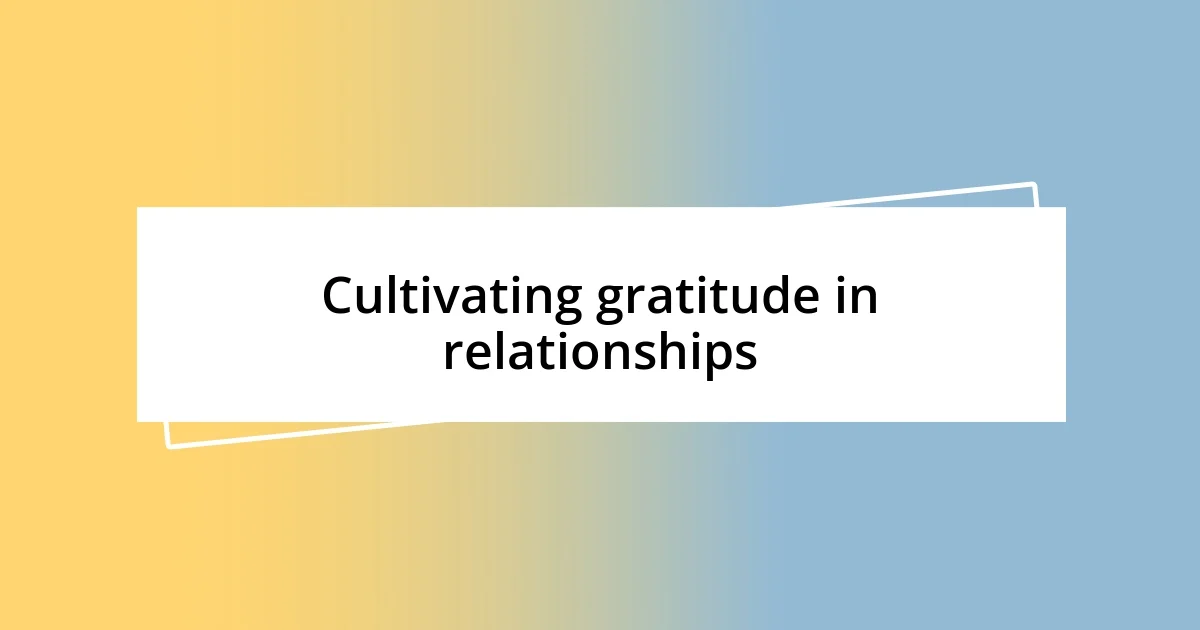
Cultivating gratitude in relationships
Cultivating gratitude in relationships begins with the simple act of acknowledging the people who matter most. I often find myself writing little notes to my partner, expressing appreciation for the mundane things they do—like making coffee the way I love it or leaving a sweet voicemail. It’s incredible how such small gestures can spark joy and deepen our connection. Have you ever noticed how a heartfelt thank-you can lighten the atmosphere?
Building on that, I’ve discovered that sharing gratitude during moments of conflict can be transformative. The last time my sibling and I had a disagreement, I suggested we each share something we appreciate about the other before jumping into our discussion. It shifted the entire tone of our conversation, reminding us of our love and respect for one another. It’s like bringing a little sunshine into a stormy day—don’t you think that focusing on the positives can help ease tension?
Lastly, I believe it’s crucial to express gratitude for the growth and changes we see in each other. When my best friend started a new career, I took the opportunity to highlight how proud I was of her courage to embrace change. It’s moments like these that help us celebrate not just the relationships themselves but the journey we take together. How do you feel when someone acknowledges your growth? It’s those affirming moments that can uplift our spirits and fortify our bonds.
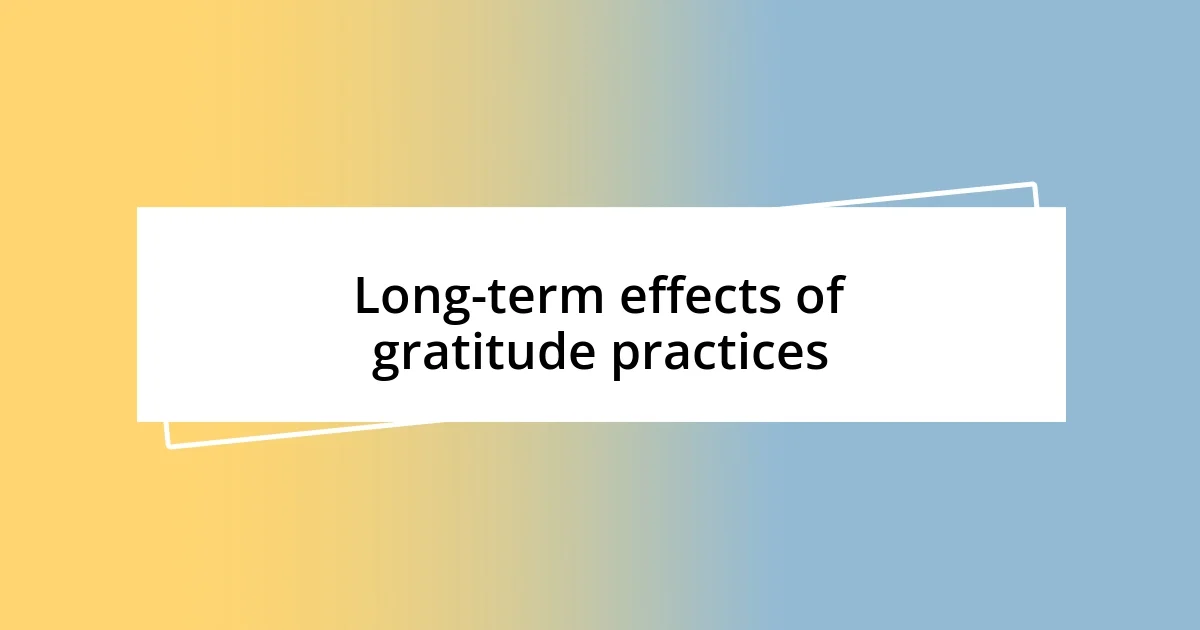
Long-term effects of gratitude practices
Embracing gratitude as a long-term practice can yield remarkable changes in our lives. I’ve noticed that over time, a consistent acknowledgment of what I’m thankful for has not only reduced my everyday stress levels but also enhanced my overall mood. It’s like cultivating a garden; the more you tend to it by consistently expressing gratitude, the more vibrant and varied the blooms become. Have you found that maintaining a gratitude journal shifts your perspective on daily events?
On a deeper level, the long-term effects of gratitude extend to how we perceive challenges. I recall facing a particularly tough professional setback that could have derailed my motivation. Instead of spiraling into negativity, I took a moment to reflect on the lessons learned from that experience. This shift in mindset didn’t just help me move forward—it fostered resilience. Isn’t it fascinating how a simple act of reflecting on positives can change our trajectory in trying times?
Finally, the ripple effects of gratitude practices can manifest in our relationships, creating a feedback loop of positivity. I remember hosting a small gathering where I prompted everyone to share something they appreciated about each other. The room buzzed with warmth and laughter, and it deepened our connections in ways I hadn’t expected. It’s impressive how gratitude can forge bonds and foster an environment where we feel safe and valued. Don’t you think that investing time in expressing appreciation can reinforce a supportive community around us?





